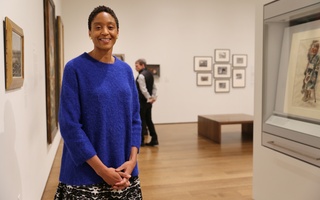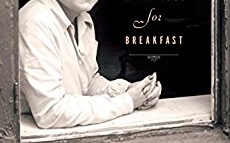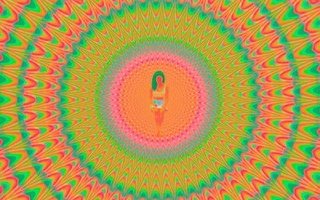{shortcode-15c44f460bc483d33e979cb931efc338f88db410}
The last we heard from Noname, at the end of her 2016 mixtape “Telefone,” she left us in the waning light of a Chicago sunset with a description of her own funeral on our minds and the jazzy hum of an outro in our ears. Two years later, on her debut album “Room 25,” she picks up where she left off and fills us in on everything we missed in the interim. On “Telefone” she imagines her funeral, saying “Kanye did the eulogy,” but in the first lines of her studio debut she says “Maybe this the album you listen to in your car / When you’re driving home late at night / Really questioning every god, religion, Kanye, bitches.” Where “Telefone” is a collection of familiar and nostalgic vignettes of childhood and of home, “Room 25” zeroes in on Noname’s individual experiences and increasing distance from home and from her past, amounting to what feels like a series of diary entries that — with opener “Self” and closer “No Name”— starts and ends with the artist herself.
The past two years were eventful ones for Noname. She toured the country, moved from her beloved Chicago to L.A., and, according to a recent interview with Fader, had sex for the first time. She flaunts one of these shifts, her newfound sexuality, in “Self.” She says, in what will no doubt become an iconic line, “Fucked your rapper homie, now his ass is making better music / My pussy teachin’ ninth-grade English / My pussy wrote a thesis on colonialism in conversation with a marginal system.” With this new physical intimacy comes, inevitably, its breakdown, a topic she tackles in “Window.” Set to string instruments and hollow percussion, she raps the melancholic lines “I bought you Game 5 tickets, made my pussy the sequel / So you really don’t think about me? / And you really don’t miss me?” On paper, the words read as though they are bitter. But in Noname’s soft monotone they are lonely, longing, and internalized.
Lyrical complexity is not a reach for Noname. She strikes a delicate balance between self-reflection and social commentary, at times in the same song. In “Blaxploitation,” she employs a ‘70s sound and samples of dialogue from from track’s titular genre to riff on harmful stereotypes, gentrification, and political exploitation. “Prayer Song” begins with Noname disconnected in Inglewood, California saying “LA be bright but still a dark city / So come get your happy and your new titties.” By the song’s end, Noname raps a full verse from the perspective of a police officer to comment on police brutality, verbalizing a toxic, masculine desire for power and control in lines like “Ain’t no police locking up these n----- better than me / And my wife think I look like a man, I feel manly.” A sharp snare drum gives the final verse a feeling of increasing anxiety and terror.
In “Room 25,” Noname builds on her jazz band feel. Tracks “Blaxploitation” and “Montego Bae,” feature movie-soundtrack-style funk and reggae sounds, respectively, while tracks “Window” and “Don’t Forget About Me” include background compositions by string instruments. Alternating xylophone, snaps, and snare drum give emotional depth to percussion lines. Each instrument, beat, and vocal sounds so choreographed that, together, they create the expectation that Noname will speak at the same rhythm. Instead, her voice floats over the music, weaving in and out of the rhythm in a way that seems to make the music bend to her will.
After an album’s worth of songs owning her identity, Noname talks about herself almost like she’s hiding. In the closing track “No Name” she explains herself, and her moniker, in the lines, “‘Cause when we walk into heaven, nobody’s name gon’ exist.” Maybe that’s true, but by putting her life front and center on “Room 25,” Noname makes a name for herself.
— Staff Writer Allison Scharmann can be reached at allison.scharmann@thecrimson.com.
Read more in Arts
First Aid Kit Brings Nostalgia, Gingham to Boston

















